I totally understand what you mean by dive bomb. A few months ago, I did a 33 day fast. I would get texts on my phone in the morning upon waking up like “please eat something, or else your heart will stop”… Or in the middle of the day…“you are anorexic! Go eat something before you cause serious harm to health!” And of course, this was well-intentioned acts, friends thinking I was really doing something bad. It was impossible to convince them otherwise. They were not being mean…just uninformed and worried.
A really extended fast: going for 46-days!
@beckyjoy: GKI is the Glucose/Ketone Index. Less than or equal to 1 is considered to be therapeutic by oncologists.
Nice! I’m sure you’ve mentioned this but it’s 2 AM in Spain S i await an international flight and too tired to look–how are you tracking your keystones? Ketonix? Blood ketone meter I can’t remember the name of for aforementioned 2 AM reasons? Lol. This thread is great. I’m starting an extended fast today after 21 days of feasting in Europe. If you’re interested / want to support me here is my accountability thread–
https://www.ketogenicforums.com/t/abstainer-moderator-accountability-group/9255/18
I’ve done a few 5 day fasts and several 2-3 day ones; hoping to go 9-10 days this time around if I feel well but open to longer if my body feels good!
I also have been silently following your fasting chronicle. I love the nerdy data and science you throw in! I’m on day 8 of an EF and every day I think “wonder how Ron’s doing today?” The dive bombers and needlessly concerned people are irritating, but just ignore them, they’re not interested in understanding. You know what you’re doing and why…you are an inspiration!
@beckyjoy: I use the Precision Xtra blood and glucose monitor by Abbott. I would recommed ordering it online to get a better price. The blood glucose strips vary in price ($0.50 to $2.00 per strip usually in boxes of 25, 50, 0r 100) so be careful where you order them from. I recently saw that WalMart has some for the Precision Neo that look similar but they are a lot cheaper so I don’t know.
The blood ketone strips are much more expensive ($3.00 to $5.00 per strip) so really shop around.
I usually use eBay for my shopping and just received 100 blood glucose strips from the UK for about $0.48 per strip. My blood ketone strips are from Australia for about $1.30 per strip. Overseas the meters and strips are called FreeStyle Optium so you can look for that.
Having the one meter for both makes it easy and it even has a memory to store your data. When you buy the meter get a kit that will also contain the lancets you need for drawing blood.
Good luck on your fast and I will be following you on your thread!
Thanks @Jbird71, that is very encouraging!
I also have been following silently. I have now done a 5 and a 6 day fast. I love your detail and you going geek. I plan to continue IF and add longer ones at times. I find it mental for me not physical most of the time. Again Ron thanks for sharing all you do with us.
Day 21 and 493 hours fasted on water, coffee, bone broth, electrolytes, and occasional heavy cream. I am loving this fast as I feel great and really can’t believe I haven’t eaten anything in almost 3 weeks! Here are my numbers for today:
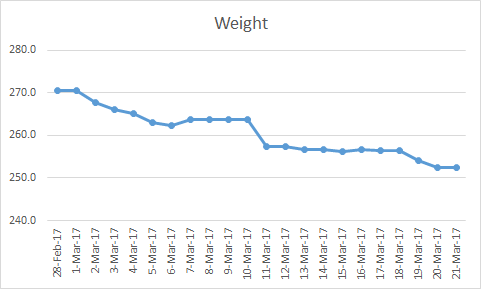
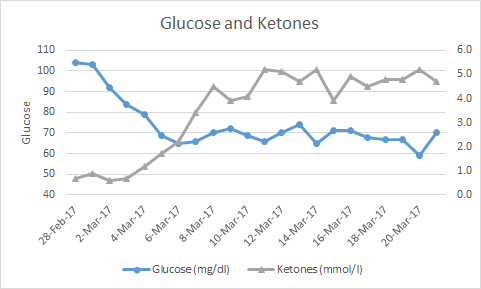
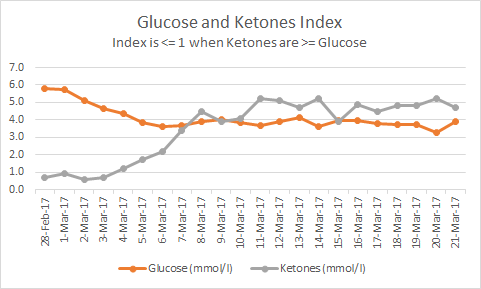
A year ago I could not imagine myself fasting for more than a day or two but here I am on day 21 already! I had the idea to fast for Lent last October and worked up to it with monthly fasts of from 6 to 10 days in November – February. Doing a longer extended fast is as easy as doing 7 days, just adding on the days!
As I’ve said many times the biggest challenge is the mental thing of “Let’s just sit down and have a nice juicy steak like that picture we saw earlier!” I am fortunate there are no medical issues so I just push past those sometimes nagging thoughts and continue. Last Saturday I was at a retreat from 8:00 to 3:00 and then at bingo from 4:00 to 10:30 and really didn’t get enough salt and electrolytes and I could tell that. This weekend is similar but I will be better prepared with the stuff I need.
Electrolytes: sodium, potassium, and magnesium are all essential and are easily depleted especially when fasting. Many natural foods meats and whole vegetables can provide needed electrolytes but I would have to be eating to get the benefits, so I need to supplement. I will do a brief review of why we need each of these minerals.
Your body needs some sodium to work properly. It helps with the function of nerves and muscles. It also helps to keep the right balance of fluids in your body. Your kidneys control how much sodium is in your body.
Potassium is a mineral that helps your nerves to function and muscles to contract. It helps your heartbeat stay regular. It also helps move nutrients into cells and waste products out of cells.
Magnesium is a nutrient that the body needs to stay healthy. Magnesium is important for many processes in the body, including regulating muscle and nerve function, blood sugar levels, and blood pressure and making protein, bone, and DNA.
As you can see, all 3 deal with multiple things in the body and one of those is muscles and suppressing muscle cramps. Potassium and magnesium are best known for helping with this. Sodium, on the other hand, helps balance the fluids in our body most importantly our blood. Too little sodium and our blood becomes thicker and sluggish which causes us to feel the same way.
Many people fear high sodium as they have been told that it leads to high blood pressure. Many studies in the last 30 years refute that statement and point to insulin resistance as the cause and the higher sodium levels are caused by the higher carbohydrate diets most people eat. So, insulin resistance actually causes hypertension while sodium is just associated with it as a by-stander. Many doctors from general practitioners to cardiologists have said that the recommended salt intake of 2300 mg/day is woefully low and it should be 4000-4500 mg/day for heart health.
There are recent, last 15 years, studies which have shown that sodium levels < 2000 mg/day are more harmful than intakes > 6000 mg/day. Remember, take you sodium!
I take about 2 to 2.5 teaspoons of salt using Himalayan Pink or Real Salt. I also use Lite Salt for potassium as it has less sodium and plenty of potassium. Then I do take a magnesium citrate supplement as well.
Day 22 and 516 hours fasted on water, coffee, bone broth, electrolytes, and occasional heavy cream. I am loving this fast as I feel great and really can’t believe I haven’t eaten anything in over 3 weeks! Here are my numbers for today:
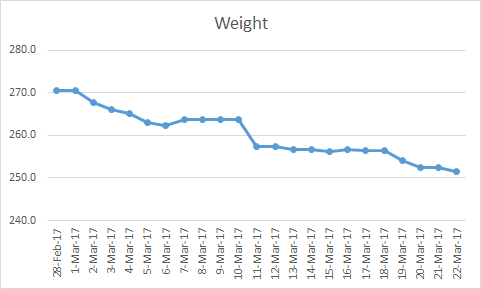
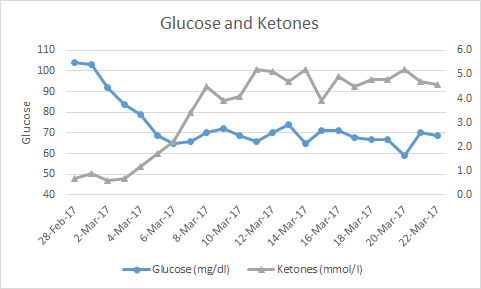
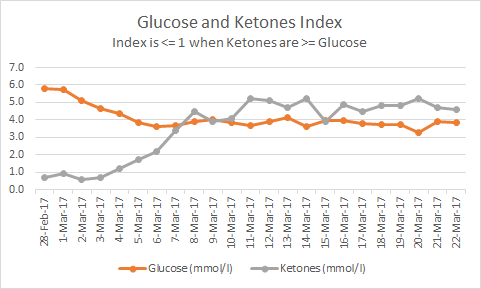
Well, I’m past the 3-week point now and in 2 more days I will be over the hump, half-way to my 46 day goal! I really do feel great, there are no physical signs that I am fasting (starving) as I don’t feel any hunger. My stomach rarely growls so I just don’t really think about my next meal. In fact, yesterday I worked right through lunchtime and it was about 3:30 when I realized that I hadn’t moved out of my office in quite a few hours so I got up and grabbed a glass of water, with electrolytes, and a cup of coffee—need to stay hydrated!
A friend stopped by to visit and to pick up some things and my wife invited her to stay for dinner. She had prepared a pasta free lasagna using spaghetti squash with a wonderful tomato/meat sauce and lots of cheese! While it looked and smelled heavenly, I sat with them and sipped some bone broth and wasn’t tempted to even try a bite!
Part of my inspiration for this fast is religious so I am learning about suffering, or really, self-denial, as there is no physical suffering. As I have talked about frequently, the mental game is the most challenging. Fasting can be viewed as a discipline exercise as you must make the choice to go forward to the end regardless what other thoughts tell you. So the mental pain and anguish I go through when that little voice says “Hey, let’s have a big, juicy bacon cheeseburger with no bun and extra bacon and cheese” I have to steel my will a bit and just move on.
I mentioned starvation above as that is the medical term for fasting. Is there a difference? The main difference lies in the purpose for the abstinence from food. Both starvation and fasting can be customized to fit the purpose of the event whether it be a medical study or the fast that I am doing. There are different fasts and they are usually named by the nutrients that are allowed to be consumed: water-only fast, fat fast, my water, coffee, broth, electrolytes, and occasional heavy cream fast, and there was a person who recently posted about his bacon experiment where he ate nothing but 2lbs of bacon every day for 30 days!
Fasting and starvation are not a bad thing: all of the major religions have used it for thousands of years. I was reading a homily from St. Peter Chrysologus, a 5th century bishop and he said: “There are three things, my brethren, by which faith stands firm, devotion remains constant, and virtue endures. They are prayer, fasting and mercy. Prayer knocks at the door, fasting obtains, mercy receives. Prayer, mercy and fasting: these three are one, and they give life to each other.”
“Fasting is the soul of prayer, mercy is the lifeblood of fasting. Let no one try to separate them; they cannot be separated. If you have only one of them or not all together, you have nothing. So if you pray, fast; if you fast, show mercy; if you want your petition to be heard, hear the petition of others.”
Fasting can also be for a few hours, we all fast about 12 hours each night, or for multiple days, it is flexible! Think about getting a ‘fasting’ blood test, or fasting before a medical procedure; fasting is very common but modern man looks at it as inconvenient.
And no, there is no starvation mode unless your body fat is exceptionally lean like a body mass index of 7% or less (normal is 25%, overweight is >=30%).
This caught my eye:
Magnesium is important for many processes in the body, including regulating muscle and nerve function, blood sugar levels, and blood pressure and making protein, bone, and DNA.
I have very low blood pressure … have had related fainting episodes 3-4 times in the past year or so… is my jigsaw electrolyte supplement sufficient (I know you mentioned using it too somewhere?) or should I add another magnesium supplement with my tendency to faint? What do you use and would you recommend it?
Always check with your doctor to see if there is another reason for the fainting. Otherwise, I go for at least 400mg a day so I take a magnesium supplement each day, every other day when fasting.
I already have–it’s the low blood pressure…I have something called “vaso vagal syncope” and for me, the fainting is triggered by low blood pressure and/or pain – each of my episodes happened while recovering from a medical procedure, and incidentally, in a fasted state (though not a carefully planned, electrolyte-supplemented fast…just kind of a “not eating right now post surgery” fast? So I’m sure my sodium, potassium, and magnesium were all low)
Low blood pressure runs in my family. Doctor has repeatedly told us to not be shy adding salt to our food.
For me it makes sense that from an ancestral point of view, low blood pressure should appear with low salt in food in our family. The word “salary” comes from ancient Romans, being paid a wage with salt…salary means salt. So, it’s in my lineage that salt was available and consumed. If I don’t consume enough of it, it goes against my ancestral way of eating.
That was my first thought, too. I also tend toward lower BP, though I haven’t had issues with fainting. But I do occasionally get light-headed, and more salt seems to help. Also helps with avoiding leg cramps at night.
But I agree with Ron, always best to discuss with a doc if it’s at the level where you’re losing consciousness. Glad you’re talking with your doc about it, @beckyjoy.
Ron, I’ve been enjoying your journey, your commitment, your motivation, and your joy  Please tell me you took before pics!
Please tell me you took before pics!
Yes, I did take before pics! I even have some from my heaviest a few years ago.
Day 23 and 550 hours fasted on water, coffee, bone broth, electrolytes, and occasional heavy cream. I’m keeping busy and still having thoughts of grabbing something to eat, especially while grocery shopping and cooking more bone broth! Here are my numbers for today:
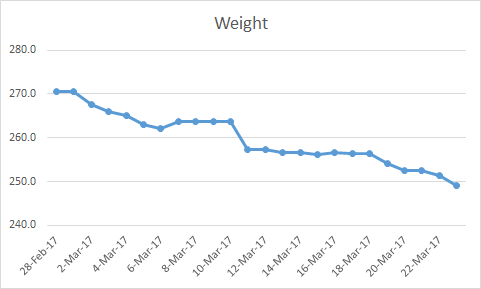
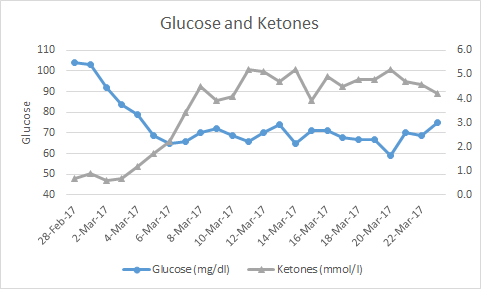
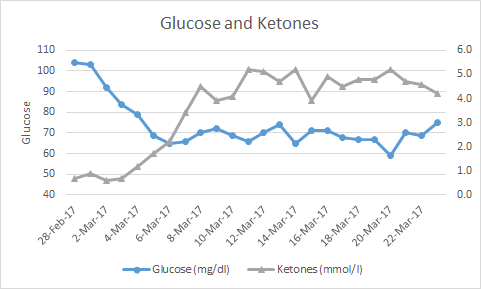
Yes, the mental games are still there and I am working to track my electrolytes better to keep me going. I try to use a ¼ tsp of salt per glass of water so I can spread it out over the day but then are times I may go 3-4 hours between glasses of water.
Went to the store today to pick up some grass-fed bones for beef broth and also talked to the butcher about some fat for rendering tallow and ordering steaks, in the future, with a good sized fat shield. Learning from @Brenda ! It is all available although he said that the grass-fed meats don’t have as much of a fat shield—I wonder if that is because farmers use grains to fatten the cows?!
Also, the fat that I bought is probably not the best for tallow, I hear I should ask for suet or the fat from around the kidneys, as that gives the best tallow. I am planning on rendering the tallow using a slow cooker tomorrow. This will be a first time and I will have to see how things turn out. Some of you may remember that McDonald’s used to cook their fries in beef tallow until they were force to move to vegetable oil much to the chagrin of their customers. I am looking forward to cooking with tallow after Easter!
One of the benefits of the steaks with the extra fat shield is my wife does not particularly like to eat fat so I will get all of hers as well!
For those of you that don’t know as much about fasting as others I want to point out some physiological facts to support my choice to go on an extended fast. Our bodies are truly miracles and they work to protect us and not let us get sick unnecessarily. Remember when I mentioned that sugar (glucose) is toxic and that is why our pancreas creates insulin; to remove it from our bloodstreams. White blood cells are another defense against infections and viruses. Cholesterol fights inflammation throughout the body. So there are many system of defense in our bodies.
Along the same line, in order to keep us alive in times of scarce food, our body will burn either glucose or fat for fuel. I’ve had many people tell me that my body will go into starvation mode because I am not eating and I will die. I mentioned starvation mode the other day and how it doesn’t happen unless your BMI is <7% when normal is 25% and overweight is >=30%. According to my numbers posted my current BMI is 32.9% so I am in no danger of starvation mode or my body burning my muscle. Why would my body burn my muscle when I need strength to go find food? Many studies have shown that when fasting Human Growth Hormone (HGH) and adrenaline are increased to help raise the metabolism and give us a burst of energy.
You can see in one of the graphs I have been posting called ‘Glucose and Ketones’ that in the first week of my fast my blood glucose went down, not as much of it to burn for fuel, while my blood ketones, created by the liver from fatty acids, increased to take over as the fuel for nearly all of my cells! At this point the only organ that needs glucose is the brain which needs about 125-150g per day. Fortunately, this wonderful body we have all been blessed with, has a liver that will produce about 250g per day of glucose for us.
If our bodies did not work this way then how did humans survive periods of famine for tens of thousands, even hundreds of thousands, of years! Our bodies adapted to LIVE, not give up easily! Our bodies, and especially our brains, actually run better on fat (ketones) than on glucose and there have been many studies that showed that people perform mental tasks better and more accurately when they are fat adapted, able to burn fat due to the low blood glucose, than when they are sugar burners.
Remember, sugar, and carbohydrates that turn into sugar through digestion, is toxic to your body! I have included a slide from the 1951 version of ‘The Practice of Endocrinology’ stating the foods that should be avoided and which should be eaten to lose weight. This list was also found as early as the 1820’s in medical books!



